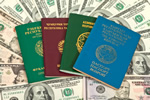Expats marrying Thais must submit to fingerprinting and criminal record checks

Expats marrying Thais must submit to fingerprinting and criminal record checks
Reports of this controversial new law first surfaced on Phuket Island, and the issue has become a popular thread on a number of expat forums in the country. All foreigners who marry Thais are affected, and criminal checks will be done once the fingerprints are taken. The change in law was first introduced in August last year but, as is usual in Thailand, has taken a good few months to trickle down to local police offices.
The story broke when a confused expat bridegroom contacted Phuket’s English language media to ask why he should need to be subject to a criminal record check just by marrying his Thai fiancé. After the media outlet had asked the question of the local Muang District’s Registration Office, the reply was equally confusing, in that the criminal record check is there to make sure expats aren’t marrying Thais simply to get a long-term stay via a marriage visa. The representative of the Registration Office declined to give his name to the reporter, adding he didn’t dream up the new rule himself.
Apparently, according to Thailand’s Department of Provincial Registration, marriages between Thais and foreigners have effects on socio-economic conditions, as some foreigners are using marriage visas to work without a permit, extend their stay in the Kingdom or indulge in illegal activities. Thai officials, it continues, have also been found to have involvement in this. The rule, it says, must be strictly enforced.
Another notice, also issued last August, was more graphic, stating that expats from 13 specified countries legally in Thailand on Non-immigrant O visas have applied for marriage visas because they are involved in illegal drugs and other criminal activities. A request for a list of the 13 countries involved was refused. Ironically, those expat bridegrooms with criminal records back in their home countries are safe from further investigation, as criminal records can only be checked within Thailand. Even so, when asked to identify the definition of a ‘suspicious criminal history’, a refusal was the answer.
Related Stories:
- Expats find peace in the covid-19 refuge of Dahab town - July 20, 2020
- Expats in Malaysia still banned from overseas travel - July 17, 2020
- Asian tiger economies reach out to expats in Hong Kong - July 16, 2020
- China hits its expats with 45 per cent tax on overseas earnings - July 15, 2020
- Foreigners and expats condemn Thailand attractions dual pricing - July 14, 2020
- Expats in Denmark get career enhancement and great work/life balance - July 13, 2020
Latest News:
- Tips on a trouble-free relocation as an expat overseas - July 20, 2020
- Expats find peace in the covid-19 refuge of Dahab town - July 20, 2020
- Is Kuwaitization the unintended result of the oil price crash? - July 20, 2020
- Expats unhappy abut changes to Korean points-based visa system - July 17, 2020
- Chiang Mai and Bangkok no longer bargain locations for expats - July 17, 2020
- Expats in Malaysia still banned from overseas travel - July 17, 2020
- Vietnam welcomes expats to its safe, affordable lifestyle - July 16, 2020
- Asian tiger economies reach out to expats in Hong Kong - July 16, 2020
- HSBC Asia to cut back on internal expat relocations - July 16, 2020
- Tips on integrating for newly-arrived expats - July 15, 2020


